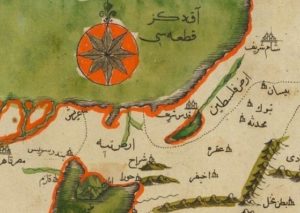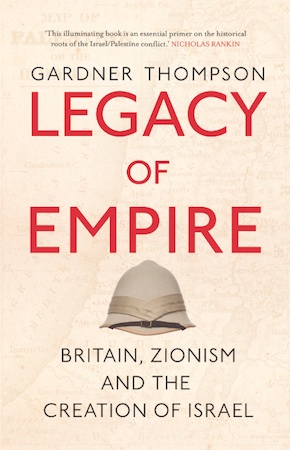The future of Palestine
by Gardner ThompsonIt is of more than passing interest that, during the premiership of Herbert Henry Asquith, the British did not seek to acquire Palestine. It was certainly not the government’s priority. Palestine was a land of relative insignificance that could be dealt with once the war was over. Under Asquith, the prevalent official British view was that Palestine was a region of limited strategic value; and that, assuming the war was won, the British and French could then conclude acceptable arrangements for this and all the lands of the Ottoman Empire.
Before and during the First World War, Palestine was not the defined, separate entity that appeared on the post-war map and foreshadowed the state of Israel. For the Ottomans, it was a remote region of limited importance. For Zionists, this was a once Promised Land from which the Jews had been exiled. But for the Arabs it was a part of Greater Syria and an integral part of the extensive Arab world which Europeans termed the Middle or Near East. Far from being a distinct territory, Palestine had long been, in the laconic words of the reflective British Arabist Nevill Barbour in 1946, ‘a somewhat arid prolongation of Syria’. When, in 1920, the Arabs declared their leader, Faisal, King of Syria, there was a general Arab assumption that this territory included Palestine. It was only months later, when the French deposed Faisal to take control of Syria, that Arab nationalists from the south focused their attention on (the now British) Palestine.
In other words, it was to be a fateful post-war decision, and a break with continuity, for the British and the French not to cultivate a united Arab world but instead to divide that world and seize the pieces they each wanted. There was much bitterness among Palestinian Arabs when they found themselves, for the first time, a distinct political unit cut off from the rest of Syria.
But this lay in the future. During the war, and before Asquith’s fall, there were indications that the British would be content, afterwards, with both Arab unity and a considerable degree of Arab independence.
Early evidence of British strategic thinking and war aims came in January 1915, shortly after the Ottoman Empire entered the war. The British cabinet considered a memorandum titled ‘The Future of Palestine’ put forward by one of their number, Herbert Samuel. Samuel was the only Jewish member of this cabinet: indeed, he was the first Jew to serve at this highest level of British government. He was also a Zionist, and his paper was a heartfelt appeal to his colleagues for Britain to acquire Palestine as a homeland for the Jews.
Samuel appreciated that he had to convince his colleagues that such a vision was in line with and would further British interests [but] his five ‘arguments’ contained more hopefulness than sound strategic calculation.”
Samuel was nothing if not direct. ‘A feeling is spreading,’ he insisted, ‘that now, at last, some advance may be made towards the restoration of the Jews to the land to which they are attached by ties almost as ancient as history itself.’ This required ‘the annexation of the country to the British Empire.’ Then ‘in course of time, the Jewish people, grown into a majority and settled in the land, may be conceded such degree of self-government as the conditions of that day may justify.’
Samuel appreciated that he had to convince his colleagues that such a vision was in line with, and would further, British interests. He struggled, however. His five ‘arguments’ contained more hopefulness than sound strategic calculation. For example, he blithely maintained, in wishful thinking to which many of his colleagues in London would fall prey, that British administration would bring so many benefits that the present Arab inhabitants of Palestine would ‘not merely acquiesce, but rejoice, in the change’. In addition, according to Samuel, possession of Palestine would raise Britain’s prestige – ‘would add lustre even to the British crown’ – and win for England ‘the lasting gratitude of the Jews throughout the world’.
More prosaically Samuel argued that, in a post-war settlement, it would be wiser for Britain to seek ‘compensations’ in the Ottoman lands of Mesopotamia and Palestine than in Germany’s African possessions, for fear of arousing ‘intense bitterness among the German people’. We may note the implication that bitterness among Arabs would be of no comparable concern. As for imperial strategy, Samuel had just one argument: that his proposal would help to secure the Suez Canal (though he somewhat undermined his case by acknowledging that ‘Palestine in British hands’ would thereby itself be open to attack).
Samuel ended as he had begun, with a fervent appeal to support ‘the Jewish race’. Palestine might be able to ‘hold’ in time up to 4 million of the world’s 12 million Jews and ‘the character of the individual Jew, wherever he might be, would be ennobled’. ‘The Jewish brain,’ he concluded, with a flush of racial pride, ‘is a physiological product not to be despised.’
Unfortunately for Samuel and his cause, the Prime Minister was not interested. Asquith did not support Zionist ambitions. He dismissed his ministerial colleague’s advocacy as a frenzied (‘dithyrambic’) outburst; and ‘despatched Samuel’s memorandum to the wastepaper basket’.
Zionism would have to wait. It was significant that there was at least one zealous Zionist at the heart of public affairs, and a triumph of sorts that Zionist goals were being discussed in cabinet and were thereby reaching a wider circle of British decision-makers. But Asquith’s government saw no strategic value in Palestine – so, no gain from its acquisition – and was unmoved by Zionism.
This episode illustrated that something important would have to change, in the course of the war and/or the course of British politics, for Zionism to receive in London the endorsement it needed.
The indication, in the story of Samuel’s paper, that ‘Palestine in British hands’ had no priority in the strategic thinking of this imperial power, was emphatically confirmed a few months later. On 8 April 1915, Asquith asked an interdepartmental committee to determine what British policy should be towards the Ottoman Empire. In particular, what should be British strategic priorities in the aftermath of war (and victory)? Chaired by Sir Maurice de Bunsen, the Committee of Imperial Defence published its report less than three months later. It is full of interest, but one assessment above all catches the eye. In a concluding paragraph it says: ‘Still less do the Committee desire to offer suggestions about the future destiny of Palestine.’

This 1732 map by Ottoman cartographer Kâtip Çelebi shows the term ‘Land of Palestine’ along the length of the Jordan River. Houghton Library/Wikimedia Commons
The committee’s analysis was to have considerable influence on subsequent British policy-making, albeit in matters other than the future of Palestine. With the security of and access to India always at the back of their minds, the committee was in no doubt that Mesopotamia was the major British concern regarding the territories of the Ottoman Empire. Moreover, ‘mankind as a whole’ would benefit from Britain’s development of Mesopotamia (Iraq), in which the British would bring back into cultivation 12 million acres of fertile soil; meanwhile, ‘we could develop oil fields’. The acquisition of Baghdad would ‘guard the chain of oil-wells along the Turco-Persian frontier’. Relating to this, ‘one of the cardinal principles of British policy in the Middle East’ is ‘our special and supreme position in the Persian Gulf’. No mention of Palestine here.
Nonetheless, more was probably required to keep British interests safe: a ‘back door into Mesopotamia from the Eastern Mediterranean’. Conceding that the French had a lasting interest in the best port of that coast, Alexandretta, they recommended as second-best Haifa, which was ‘capable of development into a sufficiently good port, and of connection by railway with Mesopotamia’. So, the committee imagined securing for Britain the lands contained in a cartographical triangle ‘whose base is from Aqaba to the Persian Gulf, and whose sides run from Acre on the west, and Basra on the east, to Mosul at the apex’. This was the marginal importance of (one part of) Palestine: that one of its harbours should be developed, so as to provide secondary support for British interests elsewhere, in Mesopotamia.
Early in the report, the British Empire’s nine strategic ‘desiderata’ are enumerated. Number One is ‘final recognition and consolidation of our position in the Persian Gulf’. The ninth and last is ‘a settlement of the question of Palestine and the Holy Places of Christendom’. To underline Palestine’s minor significance, this item is one of three ‘which may, for the moment, be set aside’, to be dealt with later ‘in concert with other Powers’. We notice that insofar as there was British interest in Palestine, it was religious and also historic. This history was not only ancient but also recent. With disputes over the Holy Places, especially Jerusalem, among the causes of the Crimean War, these sites again needed international deliberation. However, the committee concluded that ‘His Majesty’s Government should be prepared to make no claim themselves to the possession of the Holy Places, and to leave their future to be decided as a separate question, in discussion with those who stand for the national and religious interests involved.’
The report is revealing about Britain’s attitude to France, the most important ‘other Power’ referred to here. When it was written, in the middle of 1915, Britain and France were allies, committed to standing side-by-side against Germany in a conflict for which neither end nor outcome was in sight. There is little apprehension that France, with whom the entente cordiale was quite recent, might (again) become a threatening imperial rival. The committee ruled out a successful bid by France for sole control of the Holy Places, since ‘the world-wide interests affected by the destiny of the Holy Land will not allow this’. Britain acknowledged that France would claim a ‘liberally defined Syria’, but there was no reason to fear serious French ambition in Palestine. Nor was there any anticipated threat from Russia (to Palestine, as distinct from Mesopotamia).
The committee did not see ‘Palestine’ as a priority. Haifa would be an asset; the Holy Places would need attention. But the acquisition of the whole territory was not regarded as being in Britain’s strategic interest.”
Reading this report, we seek in vain any endorsement of Herbert Samuel’s argument that Palestine was needed for the protection of the Suez Canal. Rather, we may infer that there was such confidence in British Egypt’s capacity to provide all the security the canal needed, as there had been for thirty years, that there was no need to waste words on the issue. In ‘The Future of Palestine’, Samuel did not specify a threat to Britain’s strategic position, but we may assume that he had France uppermost in mind. But the Committee of Imperial Defence had few such concerns. It was bound to speculate about a future war in the area against France (and Russia). But to imagine was not to anticipate. Rather, the assumption was that European countries would recognise each other’s imperial spheres of interest in the region and agree compromises.
In short, in 1915 the Committee of Imperial Defence did not see ‘Palestine’ as a priority. Haifa would be an asset; the Holy Places would need attention. But the acquisition of the whole territory was not regarded as being in Britain’s strategic interest.
There is more to this report than is generally acknowledged. Writers on the period tend not to go far beyond quoting from the solitary, late, paragraph devoted to Palestine: ‘It will be idle for HMG to claim the retention of Palestine in their sphere.’ However, we need to acknowledge also the thinking and the calculations behind this conclusion. A product of its age, the report was certainly cynical. The casual discussion of ‘partition’ and ‘annexation’ is striking. But its authors were thorough, and they looked carefully at the long-term implications of each of the strategic options they considered.
The Balfour Declaration, issued two years later, was by contrast romantic in its vision and naïve in its neglect of consequences.
Adapted from The Legacy of Empire: Britain, Zionism and the Creation of Israel (Saqi Books, £20)
 Gardner Thompson is a historian of British colonialism and a fellow of the Royal Historical Society. He earned a BA in History from Cambridge University, an MA in East African History and Politics from SOAS, and a PhD on British Colonial Rule in Uganda from London University. He taught History in Uganda, then in London where he was Head of History and Academic Vice-Principal at Dulwich College. The Legacy of Empire is published in hardback by Saqi Books.
Gardner Thompson is a historian of British colonialism and a fellow of the Royal Historical Society. He earned a BA in History from Cambridge University, an MA in East African History and Politics from SOAS, and a PhD on British Colonial Rule in Uganda from London University. He taught History in Uganda, then in London where he was Head of History and Academic Vice-Principal at Dulwich College. The Legacy of Empire is published in hardback by Saqi Books.
Read more
@SaqiBooks


